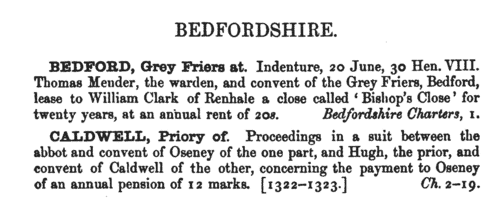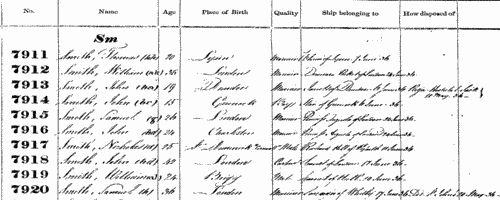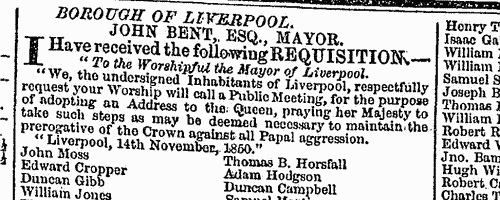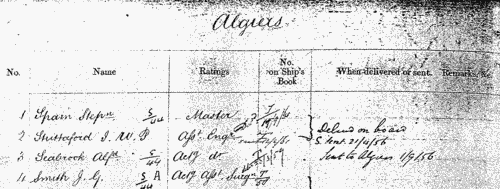Pover Surname Ancestry ResultsOur indexes 1000-1999 include entries for the spelling 'pover'. In the period you have requested, we have the following 16 records (displaying 1 to 10): Buy all | | | Get all 16 records to view, to save and print for £88.00 |
These sample scans are from the original record. You will get scans of the full pages or articles where the surname you searched for has been found. Your web browser may prevent the sample windows from opening; in this case please change your browser settings to allow pop-up windows from this site. Worcestershire Charters
(1290-1299)
A large accumulation of documents preserved in the Bodleian Library, Oxford, formerly constituted the antiquarian collections of Anthony a Wood, Roger Dodsworth, Ralph Thoresby, Thomas Martin of Palgrave, Thomas Tanner bishop of St Asaph, Dr Richard Rawlinson, Richard Furney archdeacon of Surrey, and Richard Gough. A calendar of these was prepared by William H. Turner and published in 1878 under the title 'Calendar of Charters and Rolls preserved in the Bodleian Library'. The word 'charters' is here used in a rather loose sense, including virtually any manuscript or copy of a manuscript, but the bulk of the contents consists of mediaeval deeds of conveyance. Turner's calendar deals with each briefly, naming the principal parties and the nature of the deed, but hardly ever lists the witnesses. Many of these charters were undated (dating of deeds did not become general until around 1350) or so damaged or defective ('mutilated' is Turner's usual description) as no longer to display a legible date. However, he contrived, from the style of the script and/or the nature of the contents, to estimate dates in such cases. The sample scan is from the start of the Bedfordshire list. POVER. Cost: £4.00.  | Sample scan, click to enlarge

| Freemen of Dublin
(1475)
The franchise rolls of the city of Dublin record the admissions of new freemen, by special grace, having served apprenticeship, or as child or son-in-law of a freeman, each fourth Friday after Easter, Midsummer, Michaelmas and Christmas each year.POVER. Cost: £6.00.  | Sample scan, click to enlarge

| Freemen of London
(1540-1550)
The long series of mediaeval registers and books of admission of the freemen of London was destroyed by fire in 1786. Thirty surviving charred leaves were gathered together and rebound, becoming Egerton MS 2408 in the British Museum. The order is jumbled and generally speaking none can be dated with certainty, although all belong to the very end of the reign of Henry VIII and the start of the reign of his son, Edward VI. These are pages from the admission books. Each entry here usually gives the name of the person admitted to the freedom; his father's name, address and occupation; his entitlement to the freedom, usually by having served out an apprenticeship to a citizen, naming the master and his trade. Then there may follow a cross-reference to M. or N., being two volumes of another set of official books denoted by the letters of the alphabet, and following each other in chronological sequence, which evidently gave details of entries into apprenticeships. These other books no longer exist: but the dates given for entry do identify the start of the apprenticeship, and so give by implication a date for the eventual admission to freedom. In the margin is the name of the city ward and the total of the fee and fine paid on admission.POVER. Cost: £4.00.  | Sample scan, click to enlarge

| Lancashire and Cheshire Marriage Licences
(1624-1632)
Licences for intended marriages in Chester archdeaconry, which covered Cheshire and Lancashire south of the Ribble (by far the most populous part of that county)POVER. Cost: £4.00.  | Sample scan, click to enlarge

|  Apprentices registered in Devon
(1720-1723) Apprentices registered in Devon
(1720-1723)
Apprenticeship indentures and clerks' articles were subject to a 6d or 12d per pound stamp duty: the registers of the payments usually give the master's trade, address, and occupation, and the apprentice's father's name and address, as well as details of the date and length of the apprenticeship. There are central registers for collections of the stamp duty in London, as well as returns from collectors in the provinces. These collectors generally received duty just from their own county, but sometimes from further afield. Because of the delay before some collectors made their returns, this register includes indentures and articles from as early as 1719. (The sample entry shown on this scan is taken from a Norfolk return)POVER. Cost: £8.00.  | Sample scan, click to enlarge

| Tradesmen of Chester
(1392-1805)
Lists of admissions of freemen of the city of Chester from the earliest surviving records to 1805 were compiled by J. H. E. Bennett and published by the Lancashire and Cheshire Record Society from 1906. These lists were extracted from the mayoral yearbooks (dating back to 1392) and twelve freemen's rolls covering 1538 to 1612 and 1636 to 1805; and a list of admissions for 1505-1506 in Harleian MS 2105 (British Library). The record does not become more or less continuous until about 1490: in all, 12,426 freedoms are recorded. Freedom of the city, necessary to practise a trade in the city, could be obtained by birth (in which case the father's name and occupation are usually given); by apprenticeship to a freeman (the master's name and occupation being given); or by order of assembly. Both the freemen and the masters listed are indexed here. The main abbreviations used are: B, freedom taken up by right of birth; I, freedom taken up by right of indenture; M. B., Mayor's Book; *, freedom granted by order of assembly.POVER. Cost: £4.00.  | Sample scan, click to enlarge

| Revenue Coast Guard
(1830-1831)
Appointments 11 August 1830 to 11 August 1831:
1a. Return of all persons appointed to situations in the department of the Excise, and of persons nominated as expectants to receive instructions to qualify them to become officers: giving date of appointment or nomination; name; station; salary and emolument.
1b. Return of all persons re-appointed to situations in the Excise: giving name; station in which dropped; salary and emoluments; when and to what station re-appointed; salary and emoluments. This return is split into England, Scotland and Ireland.
2. Return of the different persons appointed to situations in the departments of the Customs: stating port; office; name of officer; when admitted; and salary and emoluments.
3. This return of men appointed to situations in the Revenue Coast Guard: with date of appointment; name; rank; salary; and emoluments.POVER. Cost: £6.00.  | Sample scan, click to enlarge

|  British merchant seamen
(1835-1836) British merchant seamen
(1835-1836)
At this period, the foreign trade of ships plying to and from the British isles involved about 150,000 men on 15,000 ships; and the coasting trade about a quarter as many more. A large proportion of the seamen on these ships were British subjects, and so liable to be pressed for service in the Royal Navy; but there was no general register by which to identify them, so in 1835 parliament passed a Merchant Seamen's Registration Bill. Under this act this large register of British seamen was compiled, based on ships' crew lists gathered in British and Irish ports, and passed up to the registry in London. Each seaman was assigned a number, and the names were arranged in the register by first two letters of the surname (our sample scan shows one of the pages for 'Sm'); in addition, an attempt was made to separate out namesakes by giving the first instance of a name (a), the second (b), and so on. But no effective method was devised to prevent the same man being registered twice as he appeared in a second crew list; moreover, the original crew lists were clearly difficult for the registry clerks to copy, and some of the surname spellings appear to be corrupted. A parliamentary committee decided that the system devised did not answer the original problem, and this register was abandoned after less than two years: but it is an apparently comprehensive source for British merchant seamen in 1835 to 1836. The register records the number assigned to each man; his name; age; birthplace; quality (master, captain, mate, 2nd mate, mariner, seaman, fisherman, cook, carpenter, boy &c.); and the name and home port of his ship, with the date of the crew list (usually at the end of a voyage). Most of the men recorded were born in the British Isles, but not all (for instance, Charleston and Stockholm appear in the sample scan). The final column 'How disposed of' is rarely used, and indicates those instances where a man died, was discharged, or deserted his ship during the voyage.POVER. Cost: £8.00.  | Sample scan, click to enlarge

| Inhabitants of Liverpool
(1850)
Over 1600 inhabitants of Liverpool signed this petition to the Mayor, 14 November 1850, to 'call a Public Meeting, for the purpose of adopting an Address to the Queen, praying her Majesty to take such steps as may be deemed necessary to maintain the prerogative of the Crown against all Papal aggression.'POVER. Cost: £6.00.  | Sample scan, click to enlarge

|  Sailors and marines on H. M. S. Algiers in the Crimean War
(1854-1856) Sailors and marines on H. M. S. Algiers in the Crimean War
(1854-1856)
Sebastopol in the Crimea was the great Russian naval arsenal on the Black Sea. A combined assault by British, French and Turkish troops resulted in the reduction of Sebastopol and led to the Treaty of Paris of 27 April 1856, guaranteeing the independence of the Ottoman Empire. By Admiralty Order the Crimea Medal was awarded to sailors and marines present during the campaign, between 17 September 1854 (the first landing at Eupatoria) and 9 September 1855 (when the allies secured Sebastopol). Her Majesty's Ship Algiers, a 90-gun sailing ship, took part in the assault. Four clasps to this medal were awarded to the men present in the actions at Sebastopol itself, Inkerman, Balaklave (Balaclava) and (the sea of) Azoff, but the recipients of these clasps are recorded on separate rolls, not part of this index, but indexed on this site.POVER. Cost: £8.00.  | Sample scan, click to enlarge

|
| 1 | 2 |  |
Research your ancestry, family history, genealogy and one-name study by direct access to original records and archives indexed by surname.
|













